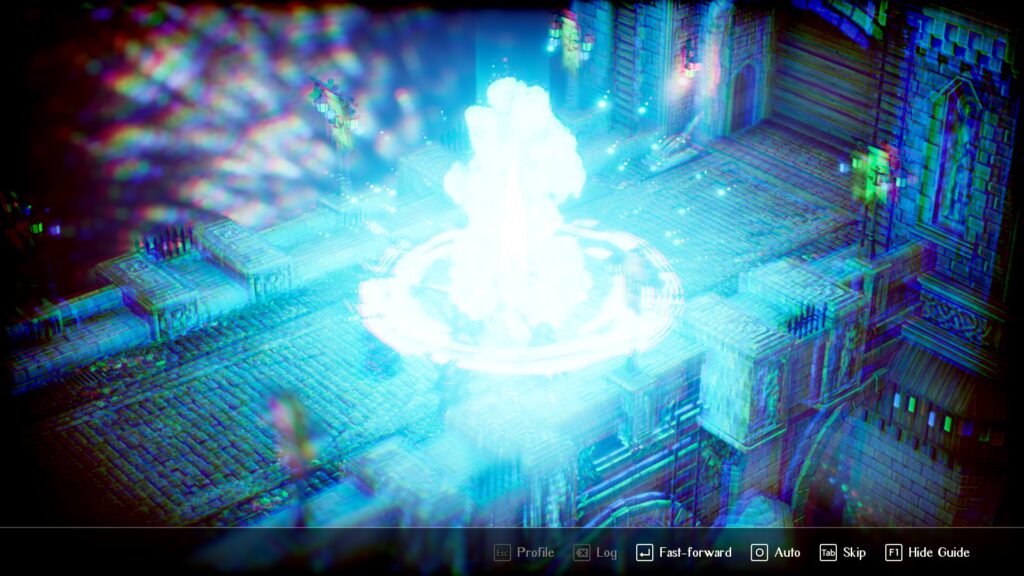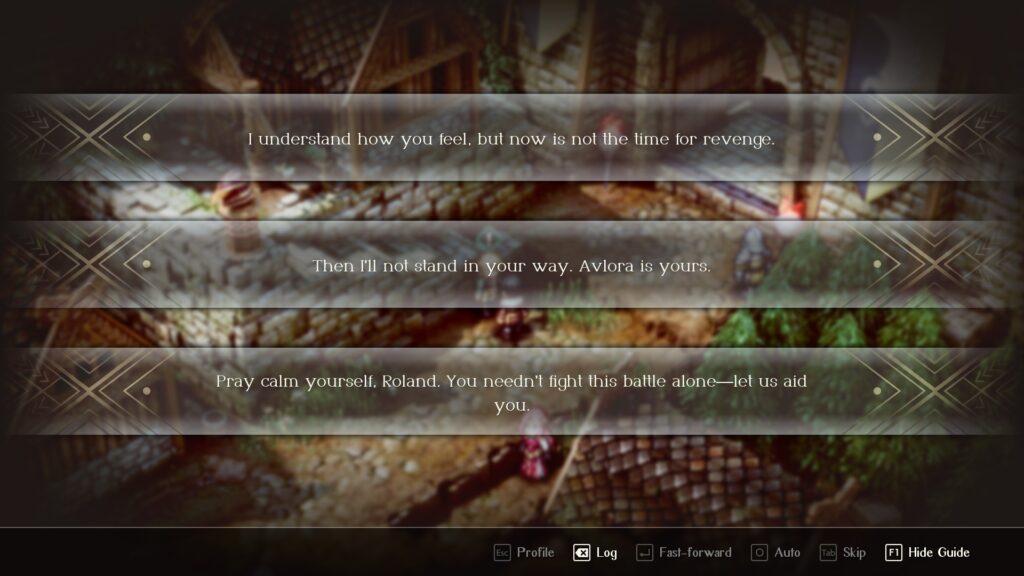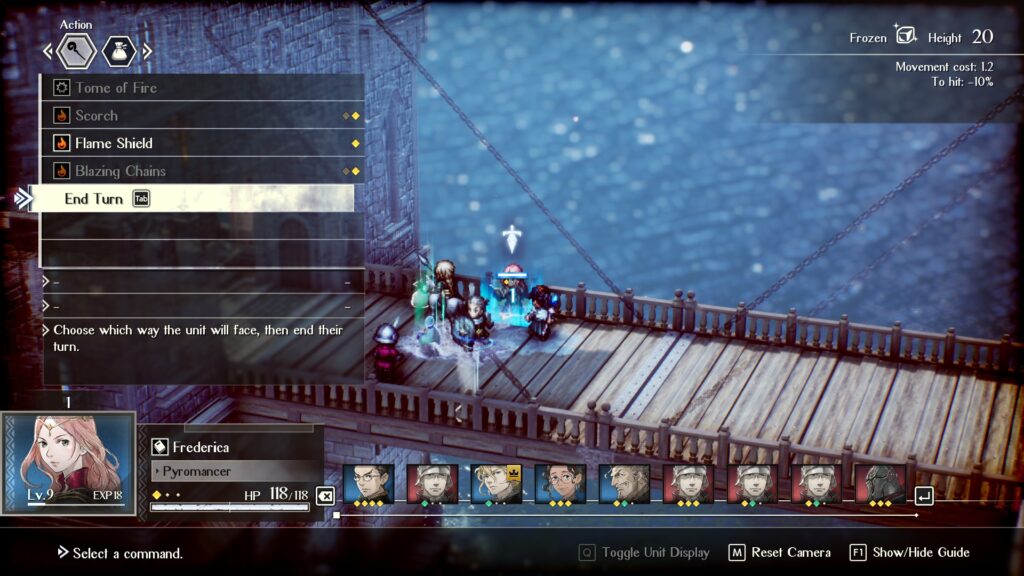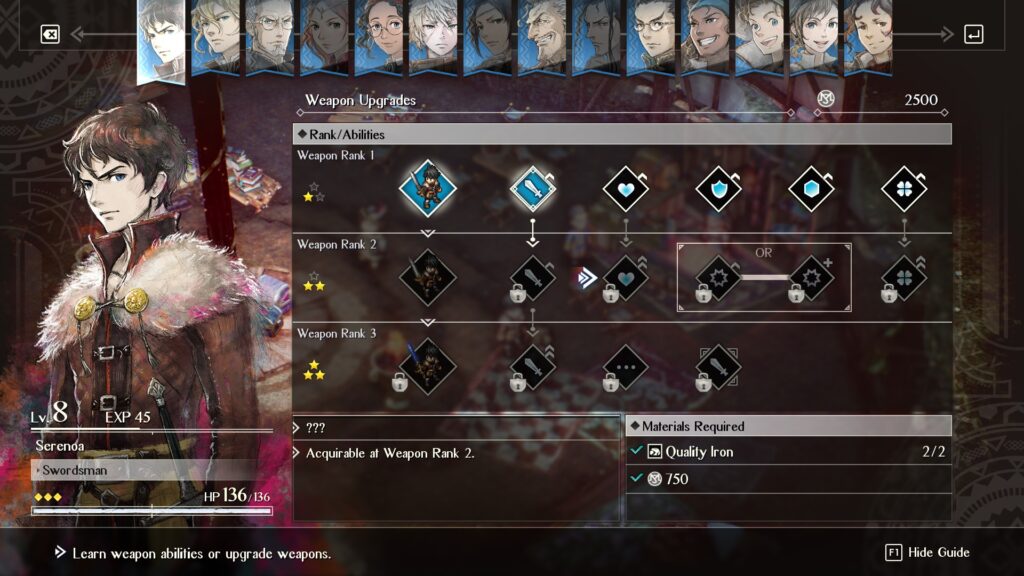
Developer: Square Enix, ARTDINK
Publisher: Square Enix
Platform: PC, Switch
Tested On: PC
Triangle Strategy (PC) – Review
Square Enix is well known for producing high-quality JRPGs, the Final Fantasy series chief among them. From this series came a spinoff known as Final Fantasy Tactics, featuring turn-based tactics gameplay while utilizing the setting of the franchise and mechanics stemming from Tactics Ogre. Now, Square has put out a new game in this genre, taking slight inspiration from the previous series but also Fire Emblem and more. Here is what Triangle Strategy has to offer.
Story
The game’s story begins with a peaceful period during which three major factions controlling the land work together on a mining project set to bring about peace. Following young Serenoa Wolffort and his retinue, the game’s story sees the player delve into political intrigue and what soon becomes a war between the aforementioned factions. Tasked with surviving as best they can and attempting to stabilize the land, players will have to make important decisions that will alter the story in several ways.
The main problem with the game’s story is the sheer blandness of the main cast and their goody-two-shoes attitude. While everything improves a lot further into the game, the initial hours need to be plodded through as a series of side characters are introduced one after another. Luckily, once everything gets going, Triangle Strategy’s story becomes rather good, featuring deep characterizations and very human drama involving natural resources and politics.
Graphics
Triangle Strategy’s graphics consist of detailed 3D renders for the environments with gorgeous 2D pixel art for characters mixed in. Bringing a style akin to that of Octopath Traveler’s to the table, the game has a lot to offer on the visual side, this being one of its strongest assets and major selling points. To further emphasize this, each of the characters has unique splash art for their profile, alongside a slew of unique environments and sights spread throughout the experience.
Sound
The game’s sound design is rather good, featuring fully voiced cutscenes plus great SFX and soundtrack. That said, neither the voice acting nor the soundtrack are used to their full strength, the first being comical and overtly exaggerated at first (or rather until used to it) with the latter often being mismatched to the current tone of the story. This is most clear when during serious scenes the track playing is almost comical in nature or excessively cheerful.
Gameplay
As previously stated, Triangle Strategy is a turn-based tactics game; however, the core gameplay is split into two major sections. These sections can be loosely summarized as visual novel-esque and actual combat. During the visual novel sections, players will mostly watch the story unfold and make decisions in order to strengthen Serenoa’s convictions. These convictions are divided into three types and alter which characters may join the team as the game progresses. Some of these decisions will also have major consequences and force the player to choose one of the branches the story splits into.
That said, these larger decisions are not truly free, as players will instead have to convince Serenoa’s retinue to vote one way or another in order for that to become the path taken. In order to do so, Serenoa will have to engage the character in a debate, presenting an argument convincing enough to sway them. These arguments are affected by several factors, including the character’s feelings about the situation, Serenoa’s convictions, and gathered intel. The latter is the most important and is available in the small explorable areas the votes are taken in.
The other section of the game, combat, plays out as is to be expected of any game in the genre. Players will command their units one by one based on an initiative order according to their speed while attempting to subjugate enemies. Although the game does feature mechanics like backstabs, terrain and height to affect damage, the combat lacks the depth of games like Disgaea or the previously mentioned Final Fantasy Tactics. Triangle Strategy doesn’t particularly innovate its mechanics or try anything new, with the largest change being how abilities require a number of action points to be used that regenerate at a rate of one per turn. While this adds a small layer of strategizing in order to not leave units without points at crucial times, it does mean mages or other ability-reliant classes are often forced to just skip a turn if they have no points left.
Although some of the characters in the game do have abilities to restore their allies’ points, these are few and far between. On top of this, there aren’t any character classes in Triangle Strategy, this means that each character has its own unique abilities instead. Besides this, units can be upgraded at the smithy to provide them with more stats or promote them into more powerful versions later on. In order to do so, players will need to accrue materials and “kudos” by performing strategic maneuvers during combat.
While mechanically simple, Triangle Strategy’s battles remain interesting even if relatively easy. Even the hardest mode doesn’t present much of a hurdle for experienced players, especially since defeat is not penalized at all, instead allowing players to keep the obtained kudos and levels by default (the only other option being reloading a save). Despite this, the game is rather well balanced in order to prevent players power-creeping enemies.
Conclusion
Triangle Strategy is a rather competent game featuring gorgeous graphics and a very well-written story. Although its combat won’t blow anyone out of the water, it is still challenging enough to be entertaining and engaging, thus making it a good starting point for newcomers to the genre. Sold for €/$59.99/£49.99, it is perhaps recommendable to wait for a sale, especially for those looking for a more mechanically deep experience.
Personal Opinion
“I’ve enjoyed Triangle Strategy a good bunch, although I have to say the amount of text that gets dumped on you at the start was starting to get on my nerves. There were far too many characters and a far too cliché twist to keep me engaged with it, although it did luckily get better once the obvious came to happen and war broke out. Even with this, I still do feel like having the player go through 4 different story sections before every single battle might be a bit much, especially since the encounters themselves don’t take that long until the later part of the game. Anyways, to give a simple opinion, I recommend Triangle Strategy to those who don’t mind long story dumps and want a competent but not super deep turn-based tactics game. Those who want a more challenging experience or just more raw gameplay should go get Tactics Ogre instead.”
Triangle Strategy (PC) - Review,2 Comments
Leave a Reply
You must be logged in to post a comment.











[…] as an entry point to the genre if anything. Having been released close to much better titles like Triangle Strategy, the game isn’t particularly worth considering, since it doesn’t innovate, and what little […]
[…] know that we’re fans of turn-based strategy RPGs, whether it’s big studio releases like Triangle Strategy or indie projects like Wargroove. Even so, there are only so many titles you can play before things […]